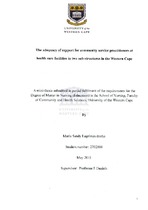The adequacy of support for community service practitioners at health care facilities in two sub-structures in the Western Cape
Abstract
Introduction: Community service Practitioner's (CSPs), Regulation 425 graduates are placed for a period of 12 months in the public sector designated health facilities where they may encounter possible challenges. The study aimed to determine the perception of CSPs regarding the adequacy of the orientation and support for CSPs' at health care facilities in two sub-structures in the Western Cape Province. The objectives were i) to establish what support systems are in place for the CSPs' at health facilities ; ii) to determine the adequacy for CSPs'; and iii) to identify possible gaps in the orientation and support structures offered at health facilities. Methodology: The study is quantitative and adopted a descriptive design. The population (N=57) included all the CSPs' that are placed in health care facilities within two sub-structures in the Western Cape. A sample of 48 participants was obtained through all-inclusive sampling. Data was collected using a self-administered questionnaire. Statistical Package for Social Science(SPSS) software version 22.0 was used for analysis of the data. Ethical considerations: The researcher received approval from Senate Research Committee and ethical clearance from the University of the Western Cape. Permission was granted by department of health and the facility managers of the health care institutions. Informed consent was obtained from participants who were made aware that participation was voluntary, prior to completing questionnaires. Results: The results indicated that the CSPs' are receiving support in designated health facilities in the two sub structures of the Western Cape. Macro and Micro Orientation, supervision in the department and rotation to other departments have been revealed to be an adequate type of support. Possible gaps were identified, namely inadequate length of orientation programmed, as well as some support structures which were either not accessible or known to participants. Recommendations were developed to overcome these challenges.

